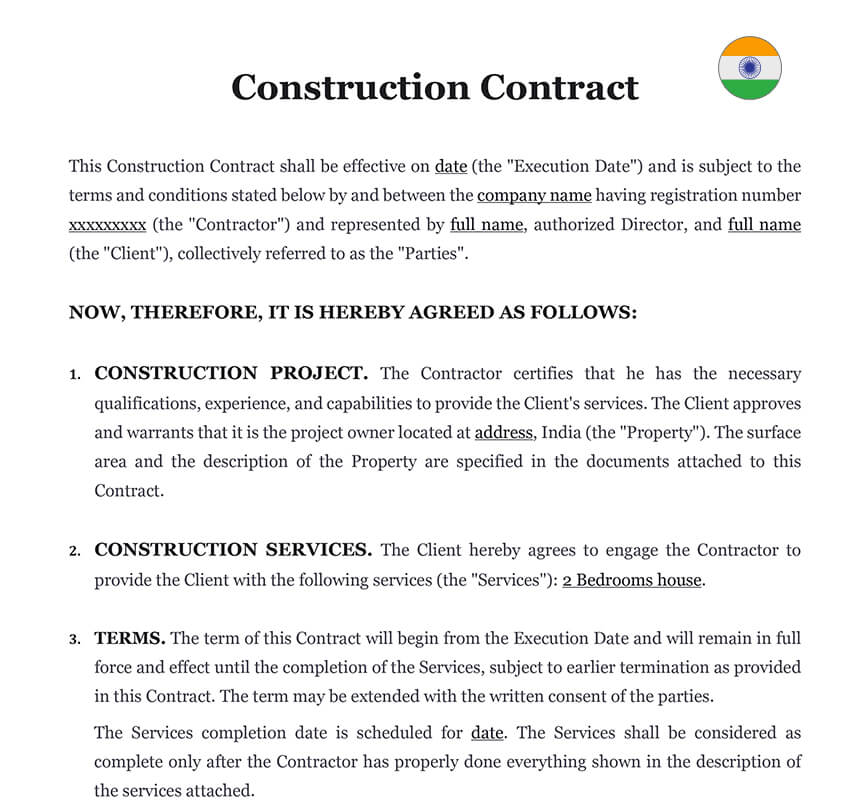Ready to use legal template
Drafted by experienced lawyers
Compliant with Indian law
Ready to use legal template
Drafted by lawyers
Compliant with Indian law
Home › Buy a property › Construction contract
Learn more about Construction Contract in India
A Construction Contract is a legally binding agreement between a property owner and a contractor that outlines the terms, conditions, and scope of work for a construction project. In India, this document plays a vital role in ensuring that all parties involved are clear on project specifications, timelines, payment terms, responsibilities, and dispute resolution procedures. Whether it’s a residential renovation or commercial development, a Construction Contract helps protect your investment and avoid costly misunderstandings. It also supports compliance with Indian laws and local regulations, such as those under the Indian Contract Act, 1872, and relevant building codes. Download our Construction Contract template, fully editable in Word format and drafted by legal experts with knowledge of the Indian construction and legal landscape.
Table of contents
-
-
What is a Construction Contract?
-
When to use a Building Construction?
-
Why use a Construction Contract?
-
What is included in the Construction Contract?
-
What are the important terms of a Building Contract?
-
What are the laws that govern construction in India?
-
What are the main types of Construction Contract?
-
What is a Construction Contract?
A Construction Contract is a legal agreement that details the services and expenses of a building project. A Construction Contract can be used to build a house or a company. The Building Contract will have varied details depending on the customer. A home contract, for example, will have different details than a commercial construction deal.
The project scope, construction timeframe, and payment schedule should all be detailed in all construction contracts. A construction timetable is a timeline that comprises construction milestones, planned dates, and an estimated completion date. A payment plan should include the expected final cost of the project, payment instructions, and whether or not a deposit is necessary.
When to use a Building Contract?
If you are on either end of the process of building, renovating, or remodeling a building or structure, you should employ a Construction Contract Agreement. Maybe you’ve finally chosen to build your ideal home and live happily ever after. Happily ever after may have to wait due to unreasonable contractor delays or unforeseen, exorbitant charges.
Perhaps you are a local contractor trying to expand your company and take on larger building jobs. In any case, make sure you have a written agreement to function as the blueprint until construction is finished to iron out the creases.
This agreement allows the parties to establish in writing the specific type and details of the work to be performed, as well as the duties of each party during the building process.
Why use a Construction Contract?
A Construction Contract is required if you are constructing, remodeling, or modifying a building or structure. Both parties are protected by a construction agreement. If you’ve recently chosen to build your dream house, a construction contract will safeguard your rights in the event of excessive building delays and material shortages, or if your contractor surprises you with unexpectedly high expenses. If you’re a contractor, the construction contract will serve as your guidance for dealing with any unanticipated complications before the job is finished.
The construction contract allows each party to specify the actual work to be done as well as each party’s duties throughout the project. The construction contract also includes the deal’s payment conditions. All contract conditions must be in accordance with applicable laws.
What is included in the Construction Contract?
The following components are frequently identified/included in the basic construction contract:
| ➤ Owner: The person or entity who hires the general contractor to build on his or her land. |
| ➤ The general contractor is the entity in charge of overseeing the work on a daily basis. |
| ➤ The general contractor's state license board number demonstrates that they are a licensed contractor. |
| ➤ Worksite: The property's location, where building will take place. |
| ➤ Work description: A full explanation of the contractor's work and construction. The agreement might also include project plans and specifications. |
| ➤ Contract pricing and payments: The entire cost of the job, as well as how and when payments will be made. |
| ➤ Contract papers include any designs, plans, exhibits, or other documents that will be included in the contract. |
| ➤ Materials and labour: Which side will provide and pay for materials and labour? |
| ➤ Starting and completion dates: The deadlines for the contractor to start and substantially complete construction. |
| ➤ Subcontracts: Whether or not the contractor will engage subcontractors to assist in the performance of some of the contractor's tasks. |
| ➤ Modifications to the agreed-upon work: How any changes to the agreed-upon work will be handled once construction has commenced. |
| ➤ Warranties: For how long will the contractor guarantee that his or her work is free of material flaws? |




